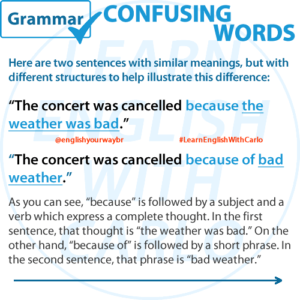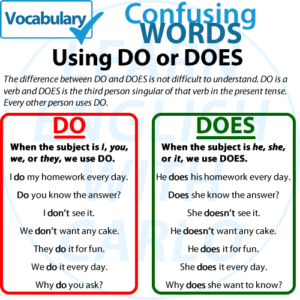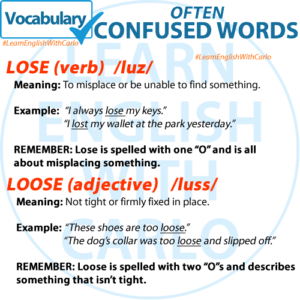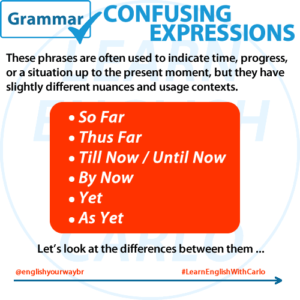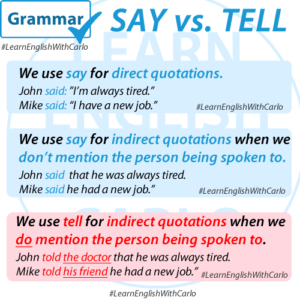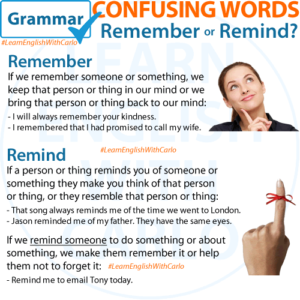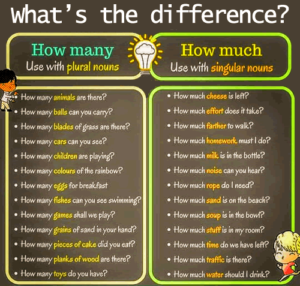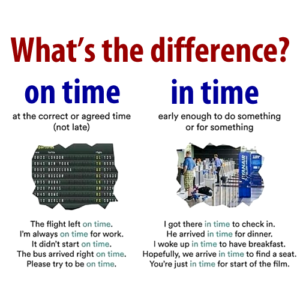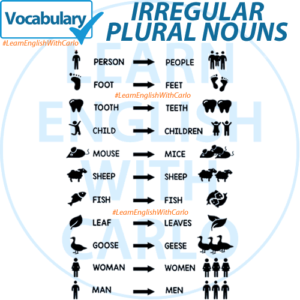What’s the difference between “because” and “because of”? In most cases, “because” is followed by a subject and a verb, and “because of” is typically followed by a single word or phrase. Here are two sentences with similar meanings, but with different structures to help illustrate this difference: “The concert was canceled because the weather …
Category: CONFUSING WORDS
Permanent link to this article: https://englishyourway.com.br/because-vs-because-of/
Dec 16
CONFUSING WORDS – DO vs. DOES
The difference between DO and DOES is not difficult to understand.DO is a verb and DOES is the third person singular of that verb in the present tense. Every other person in the conjugation uses DO. When the subject is I, you, we, or they, we use DO. I do my homework every day.Do you …
Permanent link to this article: https://englishyourway.com.br/confusing-words-do-vs-does/
Permanent link to this article: https://englishyourway.com.br/confusing-words-lose-vs-loose/
Dec 09
Confusing Expressions
So far, thus far, till now, until now, by now, yet, as yet These phrases are often used to indicate time, progress, or a situation up to the present moment, but they have slightly different nuances and usage contexts. 1. So Far 2. Thus Far 3. Till Now / Until Now 4. By Now 5. …
Permanent link to this article: https://englishyourway.com.br/differences-between-so-far-thus-far-till-now-until-now-by-now-yet-as-yet/
Nov 30
CONFUSING WORDS: Say vs. Tell
SAY and TELL have similar meanings. They both mean to communicate verbally with someone. But we often use them differently. The best way to remember say and tell is: SAY is immediately followed by a noun clause (He said (that) he was right) or, if it is followed by a personal object, we include the …
Permanent link to this article: https://englishyourway.com.br/confusing-words-say-vs-tell/
Nov 26
REMEMBER vs. REMIND
“Remember” is about your own memory, recalling information independently, while “remind” involves assisting or being prompted to recall something. If you remember something, it’s a natural act of memory. If something reminds you, it’s usually a trigger that brings a memory to your mind. REMEMBER: “Remember” is a verb that describes the ability to recall …
Permanent link to this article: https://englishyourway.com.br/remember-vs-remind/
Nov 23
SO-SO and MORE OR LESS: What’s the Difference
While SO-SO and MORE OR LESS are short and simple phrases, they serve entirely different purposes in English. Let’s dive into their meanings, uses, and nuances. 1. SO-SO: The Language of the Average Definition:SO-SO is used to describe something that is average, ordinary, or not impressive. It conveys a neutral feeling—not good, not bad. When …
Permanent link to this article: https://englishyourway.com.br/difference-between-so-so-and-more-or-less/
Nov 20
GRAMMAR – How Much vs. How Many
When we want to know the quantity or amount of something, we use HOW MUCH or HOW MANY. Key Differences: Remembering this distinction will help you use “how much” and “how many” correctly in questions and statements based on whether the noun is countable or uncountable. If you have any questions or doubts, please ask …
Permanent link to this article: https://englishyourway.com.br/difference-between-how-much-and-how-many/
Nov 14
What’s the difference? IN TIME vs. ON TIME
Many people confuse these two expressions. And while they are similar, there is a very important difference. ON time – This referrs to when you have an appointment or scheduled time to be somewhere or do something. The meeting starts at 2 pm. I have to be on time. (If I’m late something bad will …
Permanent link to this article: https://englishyourway.com.br/whats-the-difference-in-time-vs-on-time/
Nov 03
VOCABULARY – Irregular Plural Nouns
VOCABULARY – Irregular Plural Nouns Most nouns in English are made plural by adding an ‘s’ to the singular form. But there are some exceptions. Here are a few of the more common ones. REMEMBER: Always use the plural verb form with plural noun subjects. FOR MORE INFORMATION ABOUT IRREGULAR PLURAL NOUNS, CLICK HERE.
Permanent link to this article: https://englishyourway.com.br/vocabulary-irregular-plural-nouns/

